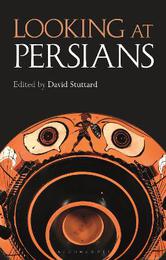
|
Looking at Persians
Hardback
Main Details
| Title |
Looking at Persians
|
| Authors and Contributors |
Edited by David Stuttard
|
| Physical Properties |
| Format:Hardback | | Pages:272 | | Dimensions(mm): Height 216,Width 138 |
|
| Category/Genre | Plays, playscripts
Literary studies - classical, early and medieval |
|---|
| ISBN/Barcode |
9781350227927
|
| Classifications | Dewey:882.01 |
|---|
| Audience | | Professional & Vocational | |
|---|
|
Publishing Details |
| Publisher |
Bloomsbury Publishing PLC
|
| Imprint |
Bloomsbury Academic
|
| Publication Date |
17 November 2022 |
| Publication Country |
United Kingdom
|
Description
Aeschylus' Persians is unique in being the only extant Greek tragedy on an historical subject: Greece's victory in 480 BC over the great Persian King, Xerxes, eight years before the play was written and first performed in 472 BC. Looking at Persians examines how Aeschylus responded to such a turning point in Athenian history and how his audience may have reacted to his play. As well as considering the play's relationship with earlier lost tragedies and discussing its central themes, including war, nature and the value of human life, the volume considers how Persians may have been staged in fifth-century Athens and how it has been performed today. The twelve essays presented here are written by prominent international academics and offer insightful analyses of the play from the perspectives of performance, history and society. Intended for readers ranging from school students and undergraduates to teachers and those interested in drama (including practitioners), this volume also includes an accurate, accessible and performance-friendly English translation of Persians by David Stuttard.
Author Biography
David Stuttard is an independent scholar and Fellow of Goodenough College, UK. He has directed his own translations and adaptations of Greek drama throughout the UK and in classical theatres in Turkey and Albania. He is the founder of the theatre company Actors of Dionysus and has edited six 'Looking at' volumes for Bloomsbury: Agamemnon (2021), Ajax (2019), Antigone (2017), Bacchae (2016), Medea (2014), Lysistrata (2010).
|